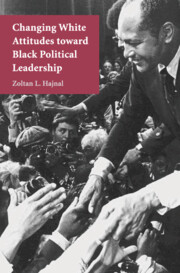Book contents
- Frontmatter
- Contents
- Acknowledgments
- Introduction
- 1 Black Leadership: The Possibilities
- 2 The Transformation of the White Vote
- 3 The Transformation of White Attitudes
- 4 Learning Across Different Cities
- 5 Black Mayoral Leadership in Los Angeles
- 6 Black Mayoral Leadership in Chicago
- 7 Other Cases Where Information Could Matter
- Conclusion: A Tale of Caution and Hope
- Statistical Appendixes
- References
- Index
2 - The Transformation of the White Vote
Published online by Cambridge University Press: 23 November 2009
- Frontmatter
- Contents
- Acknowledgments
- Introduction
- 1 Black Leadership: The Possibilities
- 2 The Transformation of the White Vote
- 3 The Transformation of White Attitudes
- 4 Learning Across Different Cities
- 5 Black Mayoral Leadership in Los Angeles
- 6 Black Mayoral Leadership in Chicago
- 7 Other Cases Where Information Could Matter
- Conclusion: A Tale of Caution and Hope
- Statistical Appendixes
- References
- Index
Summary
In this chapter, I begin to assess how experience with black leadership affects whites' political behavior. The goal of the first part of the chapter is to offer a test of the three competing explanations of white voter behavior developed in Chapter 1. If the information model is accurate, white Americans should be more supportive of black incumbents than of black challengers. If the predictions of the white backlash model are correct, whites' opposition to black incumbents should increase with time. And if the racial prejudice model is accurate, the white vote should be relatively unaffected by black leaders' incumbency. The results of this first test are fairly clear: white voters are significantly more willing to support the same black candidate when he or she runs as an incumbent. Regardless of who they face or where they run, black incumbents usually win reelection.
This first test cannot tell us why white voters change their minds about black candidates, of course. This is an important omission, because there are a number of reasons why black incumbents might get more white support than black challengers. After all, most candidates, black or white, are able to garner more votes when they run as incumbents. To address this issue and, more importantly, to see if racial learning plays a role in increasing white support for black incumbents, I will look more deeply at the nature of the white vote in black challenger and black incumbent elections in the second part of the chapter.
- Type
- Chapter
- Information
- Publisher: Cambridge University PressPrint publication year: 2006

